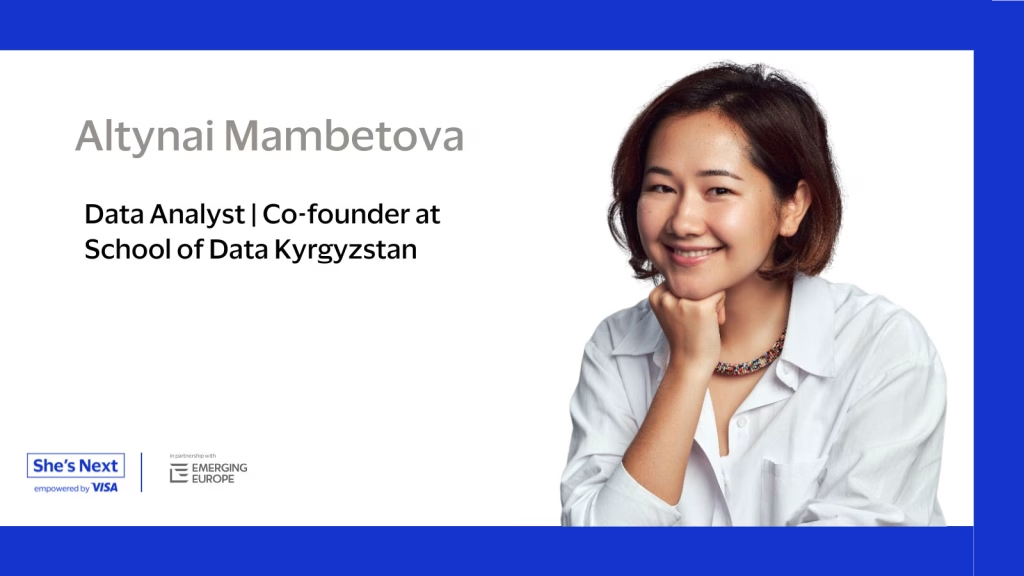
How data can help create an even playing field for women
It’s not easy being a woman in Kyrgyzstan, says Altynai Mambetova, who’s trying to change that, using data.
Altynai Mambetova is currently completing her first book, an English-language visual guide to Kyrgyzstan aimed at schoolchildren. Like all of Mambetova’s work, it’s data led.
“It’s colourful, and it’s all about Kyrgyzstan,” says Mambetova. “It presents Kyrgyzstan using data, math, statistics and illustrations. It will be on Amazon, and it will be available across the world.”
Like everything Mambetova does, the book is driven by her love of data and—perhaps equally importantly—her firm belief that data can be a force for good in the world. It was this belief that led her, along with two colleagues, to create her NGO, School of Data, part of a global network working on empowering civil society organisations, journalists and citizens with the skills they need to use data effectively.
“Policy decisions should not be taken on intuition, but taken using data,” she says. “Using data in the right way creates better policies.”
Mambetova’s interest in data goes back to her time as a journalism student, when she realised that data offered a window into otherwise hidden stories. “But it’s difficult to tell these stories if you don’t have the specific skills,” she says.
School of Data helps uncover these hidden stories—and more besides—by offering a range of courses and guidance for teachers, students and anyone with an interest in open data.
“My colleagues and I saw that there is a huge demand for data literacy and for growing and nurturing a community around data. Our big idea was to bring data driven decision making wherever it was needed,” she says, adding that a for-profit arm of School of Data helps to fund the NGO’s activities.
“We help companies and organisations build better, data driven products,” she says.
Women in Kyrgyzstan
One of the areas where Mambetova believes that data can be a force for good is gender.
“Gender data is one of the areas in which I specialise and it’s an area I am hugely invested in,” she says, recognising that Kyrgyzstan remains a staunchly male-dominated society.
“If we want, for example, to campaign for more girls’ or women’s education programmes we have a much better case if we can back up that need with data. Many girls quit school [in Kyrgyzstan] far too early and they don’t finish their basic education. We need to do something about that, and we can prove we need to something about it because we have the data.”
Mambetova says that “it’s not easy being a woman in Kyrgyzstan” and points to being ignored in meetings, or not taken seriously. It’s something that she has faced in her role with School of Data, a women-led organisation.
“We do have data (of course) that suggests things are slowly changing in some areas, such as access to healthcare and education, or the percentage of women in different specialisations, but there are also some things that haven’t changed, for instance violence against women and girls. This is still a huge problem.”
School of Data is currently advocating for the inclusion of gender statistics modules at universities.

“We’ve been collaborating with some universities to help them create this module, showing them how to understand certain indicators, because it’s not always easy for people who are not statisticians. We are also creating different online courses on the School of Data platform which we share openly in Kyrgyzstan.”
Mambetova says that accessing data in Kyrgyzstan is an “ongoing fight” but one that she appears to be winning. Nevertheless, “once a data set is open there is no guarantee that it will stay open,” she adds.
Creating communities
Last year, trying to learn more about data science and acquire new technical skills, Mambetova realised that the data community in Kyrgyzstan and across the region, much like the tech community, was made up almost exclusively of men.
“If you attend a meetup, then 90 or 95 per cent of the participants are men. It’s the usual case. All the questions come from men, for male speakers. [As a woman] you feel left out.”
In response, Mambetova has created a community called Women in Data. “It’s an informal community where we try to share opportunities with women,” she says. “it’s a safe environment for other women to share their thoughts and their opinions.”
Being a part of this kind of community allows women to be heard, Mambetova believes, and to get advice from other women about their career paths. “This is especially important when you’re trying to transition from one career to another, and you see all these men and you feel left out. I would suggest other women who are trying to transition to tech roles join this kind of community.
“And if there isn’t one, initiate one!”
Art & data
One of Mambetova’s biggest current passions is combining art, data, and communication. She is a huge believer in the power of physical representations of data to convey often complex messages.
“Presenting or talking about data and using different charts is not always enough,” she says. “Many people either don’t understand charts or don’t build an emotional connection to them. That’s where art can make a real impact.”
She offers as an example an exhibition of data led art detailing the problems facing a remote region of Kyrgyzstan that has been left without young people because of migration. “People turn 18, they go to another country, they migrate, because there are no opportunities.”
So what Mambetova and her team did was to visualise the data, creating a powerful, emotional exhibition that won great acclaim.
“Data as art is a strong way to communicate different issues,” she says.
Ultimately, this kind of project is about driving the kind of change Kyrgyzstan and other countries in the region need. It’s about using data for form opinion, and policy. Entrepreneurial figures such as Mambetova are just the kind of people to bring that change about.
“We are just trying to build a network of people who work with data and who promote data driven decision making.”
New Free Courses — Made for Ambitious Women Entrepreneurs!
It’s time to grow smarter, adapt faster, and take your business global.
Explore two powerful courses available exclusively to She’s Next members:
The Reinvention Masterclass for Start-up Founders
Beyond Borders: Building for Global Success
Enroll today — it’s free!






Responses